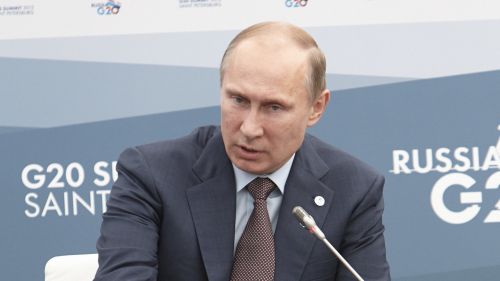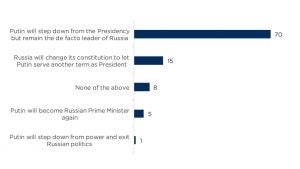Putin Keeps Experts Guessing about His Post-2024 Plans

As the end of Putin's presidential term limits draw closer, many international observers wonder what Russia's leadership will look like after 2024.
Vladimir Putin’s political career
Vladimir Putin has served as Russian president or prime minister for two decades now, and his current term was supposed to close in 2024 according to constitutional term limits. As the end of Putin’s presidential term limits draw closer, many international observers wonder what Russia’s leadership will look like after 2024. Will Putin extend his presidency or find an alternative way to stay in power? Recent developments in Russia with proposed constitutional amendments and the spread of the coronavirus in Russia have only led to greater speculation about Putin’s next moves.
A recent survey of American experts on the US-Russia relationship conducted jointly by the Chicago Council on Global Affairs and The Fletcher School of Law and Diplomacy at Tufts University found that most of these scholars expected that Putin would step down but remain the de facto leader of Russia. The survey sample consisted of 2,062 participants from the 2019 Association for Slavic, East European, and Eurasian Studies conference in San Francisco as well as 57 US experts on Russia whom the council has previously surveyed, of which 201 American experts responded. When the survey was fielded (January 27 – February 20, 2020), Putin’s continued leadership seemed to be the way political events were unfolding in Moscow. The minority of experts who said that Russia will change its constitution to allow Putin to continue as president may be the ones who will be ultimately correct. However, how the situation will develop remains difficult to predict, as the outbreak of COVID-19 has upended Putin’s political agenda.
In January, Putin proposed sweeping constitutional changes that would transfer some powers from the presidency to the parliament and a body called the State Council. Although Putin would be constitutionally ineligible to run for president, he would be allowed to chair the State Council, a body created in 2000 to advise the president. This development came less than a year after former Kazakh President Nursultan Nazerbayev resigned as president but retained his chairmanships of the Constitutional Council and the Security Council, effectively maintaining leadership without the title of President. Many experts viewed Putin’s move as simply taking a page from Nazerbayev.
The survey conducted two months ago asked American experts on US-Russia relations what was likely to happen in 2024 when Putin reaches the end of his constitutional term limits. Seventy percent of this group said that Putin will step down from the presidency but remain the de facto leader of Russia. Fifteen percent said that Russia will change its constitution to allow Putin to continue serving as president, which was the way political events seemed to be developing last month.
Putin's Post-2024 Plans
What do you think Russian President Vladimir Putin will do in 2024 when he reaches the end of his constitutional term limit? (%)

January 27 - February 20, 2020 | n = 201
In March, a parliamentarian in the Duma proposed a ‘reset’ of Putin’s presidential term count, which would allow him to run for two more six-year terms if he chooses. While the Kremlin claimed it was surprised by this proposal, many independent observers believe the move was, in fact, orchestrated by Putin. This change was quickly approved by the Russian Constitutional Court and the January proposed reforms to shift power away from the Kremlin to the State Duma were nixed. Putin has not yet said that he will run again in 2024, but it appears that he hopes to enter 2024 as president again, with even greater powers.
The constitutional amendments will need to be ratified by a nationwide vote, which was initially scheduled for late April. But after the coronavirus spread in Russia, Putin postponed the plebiscite abruptly without setting a new date. As Russians have been told to stay at home and practice social distancing, their focus has shifted from preparations for the referendum to the COVID-19 pandemic and weakening economy. While it is anyone’s guess how long the lockdown will last, the Kremlin’s political agenda seems to have been forgotten, at least for now.
If there is any lesson to be drawn from these developments over the last several months, it is that trying to forecast Putin’s post-2024 plans is like aiming at a constantly moving target. There are several avenues by which Putin might retain his power, be it via the presidency, the parliament, the State Council, or the Security Council. What will be most jarring for the Russian system is what happens when Putin is no longer the leader, which may not happen until he dies. Will the transition of power be smooth? Without a clear successor, it is possible that Russian elites will be jockeying for power in the absence of a ruler like Putin. With the constitutional changes established to strengthen the office of the presidency, it may be difficult to find a new leader inclined to change Russia’s course rather than continue Putin’s record of authoritarianism.